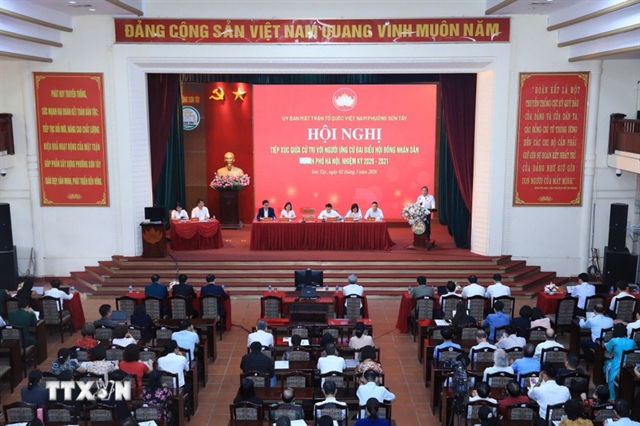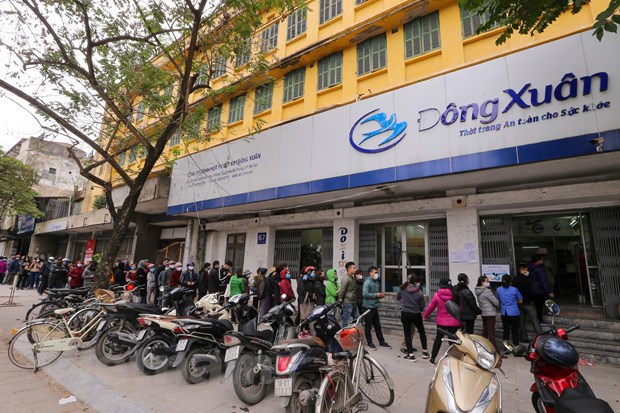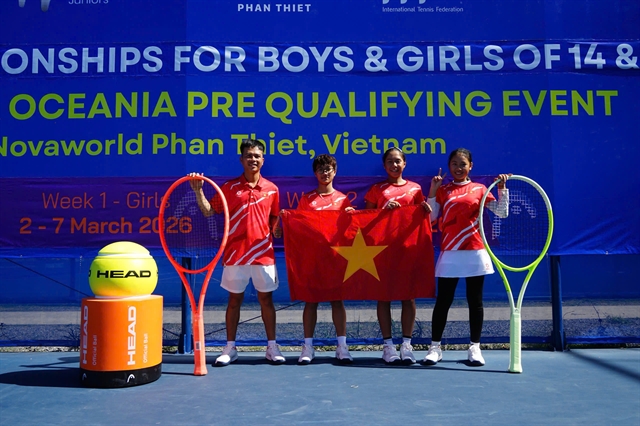 Economy
Economy


|
| People line up to buy masks at Dong Xuan Knitting on Minh Khai Street, Ha Noi. Photo VNPlus |
HA NOI — Amid the coronavirus epidemic, many textile businesses in Viet Nam have shifted to producing antibacterial masks to serve market demand.
As the Ministry of Health says Viet Nam needs 10 million masks every day, textile enterprises have rushed to fill orders.
Since early February, Vinatex and its members have cut part of their clothing production lines to produce antibacterial masks. In the last week of February, they supplied more than 5.5 million products and expect to produce 12 million more in March.
According to Le Tien Truong, Vinatex’s deputy director, the production of cloth masks has reflected market adaption and quickly responded to the new demand of local textile businesses.
The production output of six units in the group reached nearly 35 tonnes of antibacterial knitted fabric and nine tonnes of non-woven fabric per day.
As the most active firm in the production of masks, Tran Viet, general director of Dong Xuan Knitting One Member Co., said: “Our firm is not a medical unit, but in such a situation, we have learned Japanese technology for antibacterial fabric production.”
With fabric production and supply of seven to eight tonnes per day, Viet’s firm and its satellite companies can produce approximately 300,000 masks per day.
They also transferred the technology to Nam Dinh Textile Joint Stock Corporation (Natexco) and Nam Dinh Garment Joint Stock Company (Nagaco) and a part to Hung Yen Garment Corporation (Hugaco) to boost production.
Thai Nguyen-based TNG Investment & Trading Joint Stock Company (Thai Nguyen) also shifted to produce masks. Chairman of the firm, Nguyen Van Thoi, told Viet Nam News: “We have implemented production in just three days after getting standards approval from the Ministry of Health.”
TNG factories also stopped some other lines to prioritise mask production. Thoi plans to produce about two million products first. Half of them will be given out for free to local people in the area.
Using US-imported antibacterial materials to produce masks, Tran Van Quy, General Director of Trung Quy Textile and Garment Co., told Viet Nam News: “Our firm’s antibacterial cloth masks can be used up to 30 times.”
Quy’s firm cooperated with GarmentTech Pro Company, which had stopped all clothing production to switch to making masks. On average, they make 100,000 masks each day but still cannot meet demand.
So far, they have provided at least 2.5 million antibacterial cloth masks supplied to the city's supermarket system and large enterprises.
Truong Thanh Hoai, Director of the Ministry of Industry and Trade's Industry Department estimated that as much as 400 tonnes of antibacterial cloth is needed to serve local demand. He added local textile enterprises could meet the demand.
Behind the scenes
Though most cloth masks are sold at low prices of less than VND10,000 each, Nguyen Van Bach, a freelance salesperson told Viet Nam News: “They can boost their image and at the same time attract more customers to buy their products.”
While lining up to pay for her masks at a Dong Xuan Knitting store in Ha Noi, Nguyen Phuong Mai, 35, also buys other clothing items.
Mai told Viet Nam News: “I pay VND70,000 for a pack of 10 masks and more than VND2 million for other products.” Mai also said she would not have shopped here if not for the masks.
To attract more clients, Hoang Duong Trading and Service Joint Stock Company also provided 250,000 masks at stable prices.
Saigon Co.op supermarket chain ordered 1.5 million X28 antibacterial masks to sell at low prices. The Big C supermarket system has worked with suppliers to distribute more than one million masks for its customers across 37 supermarkets in 22 provinces in Viet Nam.
The cloth masks are also among the best selling items in convenient stores, drugstores and online trading websites.— VNS




